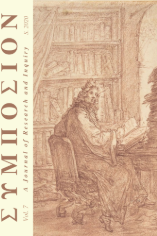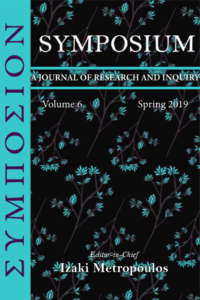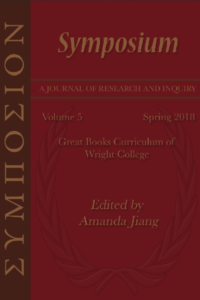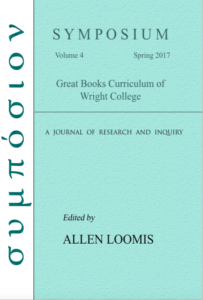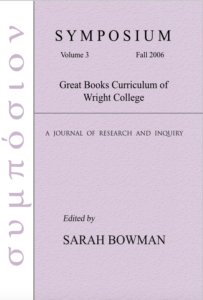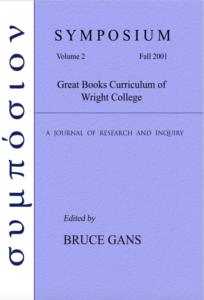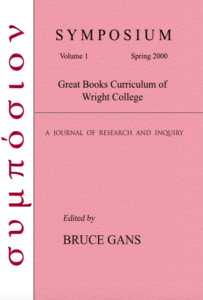Volume X Spring 2023-2024
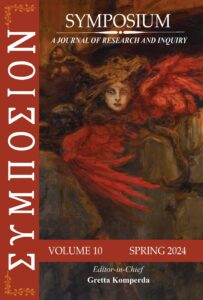
• Contributors
• Introduction – Gretta Komperda
• Undisputed Heroine, Holy Criminal, or Useless Martyr: Interpreting Antigone’s Disobedience in Sophocles’ Antigone – Marcy Frazier
• Catholic Views of Sin and Salvation in Christopher Marlowe’s The Tragical History of Doctor Faustus – Sergio Romero
• The Construction of Gothic Romance and the Burkean Sublime in Bryan Fuller’s Hannibal – Marah Mohd
• The Sisters of Sophocles’ Antigone – Alannie Cervantes
• Education and Status in Mary Shelley’s Frankenstein – Eleanor Reft
• Geoffry Chaucer’s Wife of Bath: A Product of Medieval Patriarchy – Gretta Komperda
Volume IX Spring 2022-2023
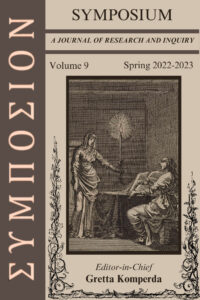 • Contributors
• Contributors
• Introduction – Gretta Komperda
• Letter from the Alumni Board
• Shakespearean Tragedies: Condemning the Patriarchy – Dianna Garzón
• Two Minds, One Body: Seeking the Truth Behind Jekyll and Hyde’s Strange Case – Jessica Gramajo
• Mary Shelley’s Frankenstein and Ethical Dilemmas – Dominika Panek
• Nonconformity to an Early Modern Society’s Expectations in William Shakespeare’s A Midsummer Night’s Dream – Gretta Komperda
Volume VIII Spring 2021
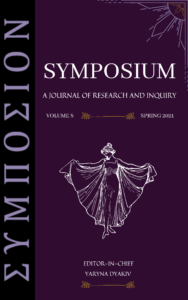 • Contributors
• Contributors
• Introduction
• Othello’s Cyprus: A Tempest Impossible to Bear Out – Melissa Glontea
• “Who Invented the Typical Girl?” Geoffrey Chaucer’s the Wife of Bath as Punk Icon – Sara Walls
• Judicial Injustice in Elizabethan Theatre – Dianna Garzón
• Iago’s Art – Sofie Kellar
• Alisoun’s Critique on Virtue and Sovereignty in Geoffrey Chaucer’s The Wife of Bath’s Prologue and Tale – Dinaz Wadia
• Thomas Kyd’s The Spanish Tragedy: Hieronimo’s Duty – Cassandra Lagunas
• Subverted Gender Roles in William Shakespeare’s A Midsummer Night’s Dream – Yaryna Dyakiv
Volume VII Spring 2020
• Contributors
• Introduction
• “Into Darkness”: Cain’s Journey into the Kantian Sublime in Lord Byron’s Cain: A Mystery – Izaki Metropoulos
• Mary Shelley’s Frankenstein: The Mother’s Job to Maintain the World – Cassandra Lagunas
• The Redemption of the Fall of Eve in John Milton’s Paradise Lost – Nina Astorino
• A Literary Feast: William Shakespeare, Paradox, and Rosemary’s Many Meanings – Madeleine Iaco
• Hyde-ing the Hero: An Analysis of Moral Corruption in Robert Louis Stevenson’s Strange Case of Dr. Jekyll and Mr. Hyde and Feodor Dostoevsky’s Crime and Punishment – Victor Colomé
• The Gay in Gray: Homoeroticism in Oscar Wilde’s The Picture of Dorian Gray – Gabriela Sotelo
• Philosophizing William Shakespeare’s Hamlet: An Analysis of Hamlet’s Development – Sophia Metropoulos
• The Faust in Dorian: Christopher Marlowe’s Doctor Faustus and Oscar Wilde’s The Picture of Dorian Gray – Gina Vasquez
• Macbeth’s Will Against Time in William Shakespeare’s Macbeth – Roberto Pacheco
Volume VI Spring 2019
• Contributors
• Introduction – Izaki Metropoulos
• Iago’s Double Identity: How Self-Deception Results in Chaos and Destruction – Julia Borrell Pozo
• “Each in His Prison”: The Monstrous Interpersonal in Three T. S. Eliot Poems – Allison Dell Otto
• The Holy Sinner: Sofya Marmeladov as an Archetype of Mary Magdalene in Fyodor Dostoevsky’s Crime and Punishment – Amanda Jiang
• The Speaker’s Desire for Immortality in William Shakespeare’s Sonnets – Roberto Pacheco
• The Justified Punishments of Dr. Victor Frankenstein and Humbert Humbert – Alisa Scott
• Manipulating Power in The Canterbury Tales, “The Miller’s Tale” by Geoffrey Chaucer – Maria Nguyen
• Huckleberry Finn’s Journey Towards Morality – Gabby Sotelo
• The Deferral of Desire in Geoffrey Chaucer’s The Wife of Bath’s Prologue and Tale – Izaki Metropoulos
Volume V Spring 2018
• Contributors
• Introduction – Amanda Jiang
• Hamlet’s Ghost as Demonic Predator: The Reformist Paradigm – Izaki Metropoulos
• Oblivion: Othello’s Devalued Identity – Alisa Scott
• Hamlet’s Existential Philosophy – Allen Loomis
• Exploration of Power in George Orwell’s 1984 – Joanna Vaklin
• The Shared Fates of Central Europe, Eastern Europe, and the Balkans – Shaun Sunkara
• Metatheatre and Agency in The Spanish Tragedy – Amanda Jiang
Volume IV Spring 2017 – Revenge Tragedy Special Edition
• Contributors
• Introduction – Allen Loomis
• The Historical Revenge Tragedy Tradition – Edgar Esparza
• Hamlet-Prisoner of His Own Kingdom – Ricky Abarca
• An Analysis of the Roles of the Supernatural in Macbeth and Hamlet – Lukasz Kornas
• Hamlet’s Distorted Grief – Kimberly Barrios
• The Duchess of Malfi and the Horse-Leech Hero – Allen Loomis
• Shakespeare’s Tragic Women: Misogyny in Othello and Hamlet – Edipson Vinueza
• “The Skull Beneath the Skin”: Death in The Revenger’s Tragedy and The Duchess of Malfi – Matthew Barge
Volume III Spring 2006
• “Judging Finely”: A Philosophical Look at Euripides’ Medea – Claudia Echevarria
• Love and Divinity: Plato’s Symposium – Paul Otake
• The Nature of Love: Plato’s Symposium – Walter Trentadue
• Cato: Master of Hegemony – Joseph J. Mauro
• Roman Propaganda: Women Admired and Condemned – Jennifer Proce
• Beauty in the Eye of the Beholder: The Tale of Genji – Noel Nicoletti
• Marital Nobility in Chaucer’s Clerk and Franklin Tales – Maria Villasenor
• Why Shakespeare Must Have Been the Author of His Own Plays – Roxane Buss
• Coriolanus – Nancy Wallace
• Shakespeare’s Hamlet versus Stoppard’s Rosencrantz and Guildenstern – Kelly Mahon
• Marriage a la Mode: The Conflict of Love and Marriage – Joi Hill
• One Night Stand with Joseph Andrews – Adriana Andrasz
• What Makes People Happy and What Does Not: Samuel Johnson’s Rasselas – Cecilia Melendez
• Marriage in Pride and Prejudice – Jacqueline Barrett
• Happiness-Dependent or Independent of Society? Austen’s Pride and Prejudice – Crystal Dynia
• Love and Society in Pride and Prejudice – Marika Malkerson
• The Hamlet: Exploring its Myths – Roxanne A. Domingo
• Characters and Demons in Faulkner’s The Hamlet – Anthony Trujillo
• Samuel Johnson’s Macbeth: Moral Community & Tragedy of Exclusion – Prof. Michael Petersen
• On Kafka’s Report to an Academy: Great Books Symposium Speech – Prof. Daniel Borzutzky
• Gods and Monsters and Mink Snopes – Prof. Bruce Gans
Volume II Spring 2001
• Anatomy of a Hero – Chad Cheatham
• Cicero’s Critique of God – Carolyn Horn
• Uses of Humor in Don’t Quixote – Tracy Wagner
• Cervantes on the Nature of Individuality – Robert Jablonsky
• Jonathan Swift: Proto Feminist – Krystie Podobinsky
• The Unloved One: The Crippling of Jonathan Swift – Sandra Cruz
• Jonathan Swift’s Woman Problem – Rita Hoffman
• Gulliver’s Travels: A Moral and Political Handbook – Edwardo Hernandez
• Dissenting View of the Great Dissenter – Angela Bogat
• Evil in the Brothers Karamazov – Angeline Tomcik
• The Glimmer Twins: Fitzgerald and Gatsby – Carrie Grachowski
• Identity and Happiness – Nichole Hermann
• Good Soldier Svejk:The Way It Should Be and the Way It Is – Paul Balsavich
• Womb Envy in Frankenstein and Brave New World – Samantha Moline
• A Comparison of “Barn Burning” and Light in August – Veronica Flores
• The Individual and Society: Three Narratives in Frankenstein – Prof. Margo Gariepy
• Memory, Computer Technology, and Identity at the New Millennium – Prof. Joo Lee
• The Past as Prologue and The Search for Identity – Prof. Harriet Rosenman
• Hamlet and the Problem of Identity – Prof. Phillip Virgen
Volume I Spring 2000
• Introduction – Bruce Gans
• A Politically Incorrect Defense of the Athenian Empire – William Wojtas
• A Moral and Practical Analysis of Military Empires – Michael Fortunato
• Just Win, Baby. Nicias, Alcibiades and the Sicilian Expedition – Joseph Spisak
• Good Man, Bad Man, Traitor: Aspects of Alcibiades – Gabriela Arcan
• The Failure of Utopia in Aristophanes’ Assembly of Women – Catherine Rodriguez
• It’s All About Respect: Social Codes in Beowulf – Neil A. Lumbowski
• Great Chain of Being in Pope’s “Essay on Man” – Diana Tirado
• Dueling Aesthetics: The Poetics of Wordsworth and Coleridge – Jack Wilson
• The Search for Peace in “A Clean Well Lighted Place” – Charles Brown
• Happiness is an Inside Job: “Old Man and the Sea” – Jeffrey Glenn
• Racism in Ralph Ellison’s Invisible Man – Carol Fosse
• Ellison’s Influence and Inspiration for Invisible Man – Barbara Sherman
